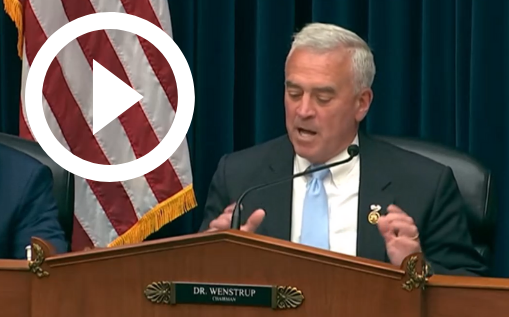
Comer & Sessions Statements on Departure of OPM Director Kiran Ahuja
WASHINGTON — Select Subcommittee on the Coronavirus Pandemic Chairman Brad Wenstrup (R-Ohio) opened today’s hearing titled “Academic Malpractice: Examining the Relationship Between Scientific Journals, the Government, and Peer Review” with a reminder that political influence and government intervention has no place in the peer review process at top scientific journals. Although the Editors-in-Chief of Nature, Science, and The Lancet were all invited to participate in today’s hearing, Chairman Wenstrup noted that only the Editor-in-Chief of Science had the courage to appear before the Select Subcommittee. Chairman Wenstrup explained how these prestigious, scientific journals wrongly published articles — such as the infamous “Proximal Origin” paper and “Lancet Letter” — to quash robust debate and discussion about the origins of COVID-19. Considering top scientific journals set the tone for what is believed and discussed in the scientific community, these journals have an obligation to publish accurate information that has completed a thorough peer review process. Chairman Wenstrup concluded his remarks by emphasizing the importance of understanding the scientific review processes at top journals to ensure best practices should a future health crisis arise.
Below are Select Subcommittee Chairman Wenstrup’s remarks as prepared for delivery:
Today the Select Subcommittee is holding a hearing to examine the relationship between scientific journals and the government.
This is not a hearing to see how the government can be more involved in the journal editorial process, but to make sure that the government does not involve itself or influence this process.
Academic, scientific, and medical journals are an incredibly important tool to spread research to the masses.
There is no denying the awesome power these periodicals, as well as their editors, hold over the medical and scientific communities, and after the COVID-19 pandemic, the world.
I utilized journals in my practice on almost a daily basis, they are an important component to the practice of science.
And because of that there can be no place for politics or inappropriate government influence.
Journals, and subsequently their editors, are telling the world about research that has been conducted, yet it is important to note they are not necessarily the arbiters of truth.
They provide a forum where scientific claims are made, defended, and debated by peer review.
However, we saw a breakdown of that during the pandemic.
Rather than journals being a wealth of information and opinions about the novel virus, they helped establish a party line that literally put a chilling effect on scientific research regarding the origins of COVID-19 and scientific communications.
As I have stated time and time again, this Subcommittee was established so we can collectively take a look back on the pandemic and see what we can do better for the next time.
We invited the editors-in-chief of The Lancet, Nature, and Science.
Only the editor of Science had the courage to come and help us be better.
And we are very thankful to Dr. Thorp for being here today and I appreciate the frank and professional conversation we had before today.
The purpose of this hearing is to demystify the publication process.
The editors hold an extraordinary amount of power within the journals and publication process – a process that is a black box to most of the public.
They act as an umpire to judge the scientific research that is being published.
Like an umpire, it is vital they know about the sport and rules of play, but they themselves should never be in the competition.
But that is what appeared to have happened during COVID-19.
And it is important to separate opinion vs. scientifically proven fact. And to highlight that varying hypotheses may exist.
The publications of papers like Proximal Origin, which this Subcommittee has exposed as lacking in scientific integrity as well as being “prompted” by Dr. Fauci and Dr. Collins, and the Lancet Letter – where the Lancet did not even bother to check for conflicts of interest – set a precedent, from two of the most prestigious journals in the world, that the natural origin of COVID-19 was the only theory plausible. Period. The end.
But this is not the case.
And anyone else who even had the inkling of another, plausible, scientific thought, was immediately labeled a conspiracy theorist.
A conspiracy theorist? How is that acceptable in the scientific community? When the entire crux of the field is about open debate?
I hope – that as you say Dr. Thorp – if a paper with an altering opinion was proposed, it would have been given a fair shot.
There is value in giving science a fair hearing. It should be the most pure and honest form of debate.
We are holding this hearing to help shed light on the journal process, so everyone can have a greater understanding of how business is conducted.
I again express my disappointment that Dr. Skipper from Nature and Dr. Horton from the Lancet declined to participate today.
And again, reiterate our appreciation that Dr. Thorp stood up and showed integrity to testify before this Select Subcommittee today.
I look forward to a strong, on topic, discussion.
###
EIN Presswire does not exercise editorial control over third-party content provided, uploaded, published, or distributed by users of EIN Presswire. We are a distributor, not a publisher, of 3rd party content. Such content may contain the views, opinions, statements, offers, and other material of the respective users, suppliers, participants, or authors.


